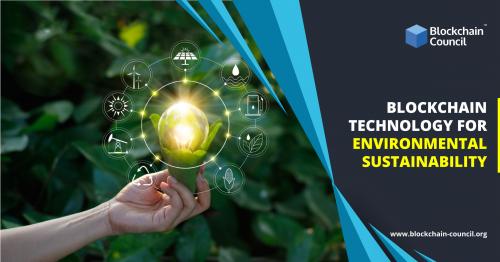Blockchain Technology for Environmental Sustainability

Introduction
Even though many states
have been marked as no plastic states, the usage of plastic bags is
skyrocketing. Without adequate environment policy and innovative technologies,
it is impossible to save our environment. Emerging technologies such as
blockchain can be leveraged to bring a revolutionary transformation, making the
world a better place to live for one and all.
Before we explore the
impacts of blockchain on the environment, let’s define this technology.
Blockchain is a chain
of blocks where digital information is stored in the public database, known as
‘chain’. It can also be defined as a distributed ledger technology that follows
a decentralized approach, meaning there is no central authority to govern.
Can Blockchain Make Environment Sustainable?
Blockchain can offer a
provable record of who exchanges what and with whom, this is one of the
fundamental factors that make the entire ecosystem environment-friendly.
Presently, many top companies are trying to solve environmental degradation
issues by using blockchain as a medium.
For example,
PlasticBank is encouraging plastic removal and recycling through cryptocurrency
and blockchain systems. Similarly, WePower focuses on improving visibility on
energy usage for conservation through blockchain. Thus we can say that
technology has its own remarkable way of saving the ecosystem.
Top Use cases of Blockchain in Environment
Sustainability
Blockchain can address
environmental challenges in various ways. Let’s discuss its top use cases.
Recycling Rewards Via Cryptocurrencies
As the earth’s water
bodies are severely contaminated, various projects are introduced to give
tangible value through cryptocurrencies to participants. Cryptocurrencies are
offered to those who recycle. Such programs are beneficial, most in developing
countries, to provide a sound incentive to recycle waste through a reliable and
easily accessible means of income.
Tracking Waste Disposal Habits
As motivating better habits
through the issuance of cryptocurrencies has proven to be an efficient method
for creating more responsible behaviors, Blockchain ledgers can also establish
a framework that can track individual’s and businesses’ waste disposal habits.
Additionally, it can also advise identifying where more improvements are
needed.
Environmental Treaty Enforcement
As the current world is
in semi-chaos on how to sustain our ecosystem, the technology can be seen as a
technique to log treaty progress concerning participating nations on an
immutable, interoperable ledger to grant wider oversight. United Nations are
handling numerous blockchain funded projects to enhance adherence to potential smart contracts.
Real-time Transparent Reporting
Blockchain is a
distributed ledger technology that aims to achieve transparency. Thus,
technology can provide transparency to donors, hence reducing the risks of fake
charities. With blockchain, donors can precisely see where their funds are
landing.
One such example is,
GiveTrack which offers real-time financial transparency and global impact
powered by blockchain.
The Verdict
For blockchain to be
sustainable, it has to go through numerous technical and political challenges.
The major problem that continues is to unlock its potential that ensures
inclusion, security, interoperability, and scalability. To what extent the
technology will attain success entirely depends on the level of development and
its adoption.
To get instant updates
about Blockchain Technology and to learn more about online blockchain certifications and
become a blockchain expert, check out
Blockchain Council.
Post Your Ad Here
Comments